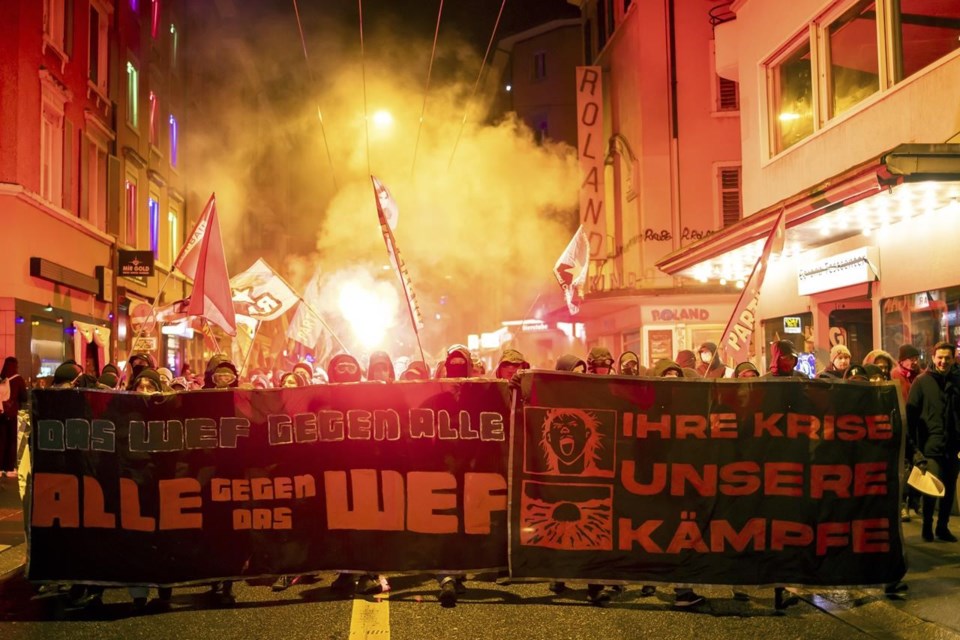DAVOS, Switzerland (AP) — The world is in a “sorry state" because of myriad interlinked challenges including climate change and Russia's war in Ukraine that are “piling up like cars in a chain reaction crash,” the U.N. chief said at the World Economic Forum's meeting Wednesday.
U.N. Secretary-General Antonio Guterres delivered his gloomy message on the second day of the elite gathering of world leaders and corporate executives in the Swiss ski resort of Davos. Sessions took a grim turn when news broke of a helicopter crash in Ukraine that killed more than a dozen people, including Ukraine’s interior minister and other officials.
Forum President Borge Brende requested 15 seconds of silence and Ukrainian first lady Olena Zelenska dabbed teary eyes, calling it “another very sad day,” then telling attendees that “we can also change this negative situation for the better."
Ukrainian President Volodymyr Zelenskyy was scheduled to address the conclave by video link as the Ukrainian delegation that includes his wife pushes for more aid, including weapons, from international allies to fight Russia. Speaking shortly before Zelenskyy was German Chancellor Olaf Scholz, who reiterated that Germany was one of the top suppliers of military equipment to Ukraine, just behind the U.S. and Britain, when asked why he had not sent tanks to the war-torn country.
While Germany has provided air-defense systems and armored personnel carriers, Scholz — the only leader to attend Davos from the Group of 7 biggest economies — is facing pressure to send tanks to help Ukraine.
Guterres said the “gravest levels of geopolitical division and mistrust in generations” are undermining efforts to tackle global problems, which also include widening inequality, a cost-of-living crisis sparked by soaring inflation and an energy crunch, lingering effects of the COVID-19 pandemic, supply-chain disruptions and more.
He singled out climate change as an “existential challenge,” and said a global commitment to limit the Earth's temperature rise to 1.5 degrees Celsius “is nearly going up in smoke.”
Guterres, who has been one of the most outspoken world figures on climate change, referenced a recent study that found scientists at Exxon Mobil made remarkably accurate predictions about the effects of climate change as far back as the 1970s, even as the company publicly doubted that warming was real.
“We learned last week that certain fossil fuel producers were fully aware in the 1970s that their core product was baking our planet," he said in his speech. “Some in Big Oil peddled the big lie.”
Critics have questioned the impact of the four-day meeting where politicians, CEOs and other leaders discuss the world’s problems — and make deals on the sidelines — but where concrete action is harder to measure. Environmentalists, for example, slam the carbon-spewing private jets that ferry in bigwigs to an event that prioritizes the battle against climate change.
On the second day, government officials, corporate titans, academics and activists were attending dozens of panel sessions on topics covering the metaverse, environmental greenwashing and artificial intelligence.
Ukraine has taken center stage as the anniversary of the war nears, with Zelenska pressing attendees to do more to help her country at a time when Russia’s invasion is leaving children dying and the world struggling with food insecurity.
The crash added more tragedy after a Russian missile strike hit an apartment building over the weekend in the southeastern Ukrainian city of Dnipro, killing dozens of people in one of the deadliest single attacks in months.
But Ukraine is gaining additional international support: Dutch Prime Minister Mark Rutte said Tuesday that the Netherlands plans to “join” the U.S. and Germany’s efforts to train and arm Ukraine with advanced Patriot defense systems.
The German government has faced mounting pressure to make another significant step forward in military aid to Ukraine by agreeing to deliver Leopard 2 battle tanks. U.S. Defense Secretary Lloyd Austin is scheduled to visit Berlin this week and then host a meeting of allies at Ramstein Air Base in western Germany.
Guterres was not optimistic that the conflict, being waged less than 1,000 kilometers (620 miles) from Davos, could end soon.
“There will be an end of this war. There is the end of everything. But I do not see the end of the war in the immediate future,” he said. Deep historical differences between Russia and Ukraine make it more difficult to find a solution based on international law and that respects territorial integrity, he added.
"For the moment, I don’t think that we have a chance to promote or to mediate a serious negotiation to achieve peace in the short term," Guterres said.
___
AP journalists Masha Macpherson and David Keyton in Davos and Kelvin Chan in London contributed.
___
Follow AP’s coverage of the World Economic Forum meeting at https://apnews.com/hub/world-economic-forum.
Jamey Keaten, The Associated Press



